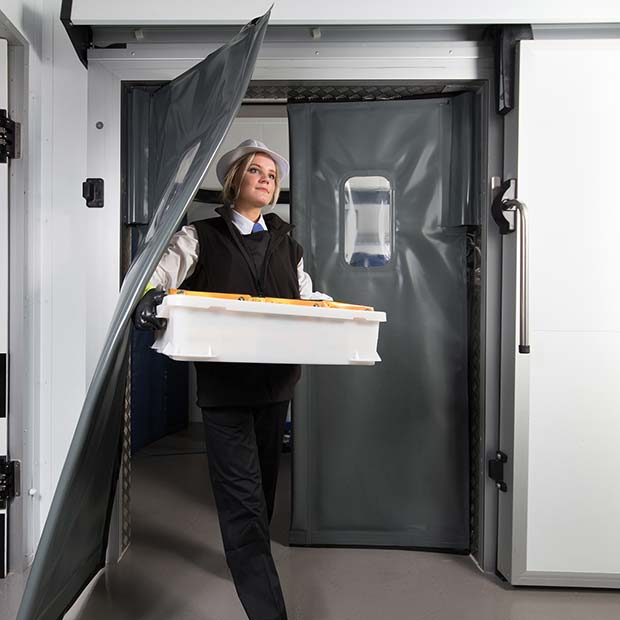Innovation and great customer service have been the driving force behind the success story of Kenfield Doors which this year celebrates its 35th anniversary in business. The Birmingham-based company, established in 1983, has grown to become one of the largest specialist door manufacturers in the UK with a wide range of clients in the warehouse and logistics industry.
 More than 8,000 customers have benefited from the services of Kenfield Doors, including major supermarkets and local authorities, and its secondary doors have been installed across many sectors including the food, heavy engineering, hospital, schools and pharmaceutical fields.
More than 8,000 customers have benefited from the services of Kenfield Doors, including major supermarkets and local authorities, and its secondary doors have been installed across many sectors including the food, heavy engineering, hospital, schools and pharmaceutical fields.
Since the launch of the company’s ground-breaking K750 insulated secondary door in 2013 thousands have been fitted in cold stores, chillers and freezers across the UK.
Asda and Aldi are among the latest major supermarket chains to adopt the uniquely designed and patented technology, which has been refined and developed after impressive results in trials with Sainsbury’s and Tesco, Morrisons and Marks & Spencer.
Kenfield’s energy-saving secondary doors bring new efficiencies and proven savings to warehouse and supermarkets, where costs are always under the microscope, said MD Tom Moloney. “In some cold stores and freezers, doors are left open to allow ease of movement. These doors can be heavy, ill-fitting and a hazard to employees. This leads to cooling systems having to work harder and results in increased energy costs which are passed on to the customer. This is where secondary doors can make a difference.”
The light Kenfield K750 secondary doors have no sharp surfaces, can be easily pushed through and closed automatically. They ensure that the temperature inside the freezer or cold store is maintained at an optimum level. When the outer door is left open a constant temperature can still be maintained throughout the plant.
Aldi has specified the K750 insulated door for its coldrooms. The programme involved 750 stores in the UK and 125 stores in Ireland. This introduction has led to a significant reduction in its carbon emissions.
Mr Moloney said: “Kenfield has completed the installation of the K750 in 360 Asda stores. Generally, customers have reported a reduction in energy consumption of more than 50% and we are pleased to report that the benefits of this have been felt throughout the supermarket and food processing industries.” Energy savings of 54% have been achieved in real-time tests on live cold rooms and freezers.
Innovations introduced this year for the K750 door include a Military Grade abrasive-resistant polyurethane outer skin, new perimeter sealing, doubleglazed vision panels, an exchangeable panel for quick and inexpensive replacement, an increase in maximum door size and improvements in flexibility and insulation.
Kenfield offers a wide range of customisable specialist doors, tailormade to the customer’s specifications. This includes warehouse doors, steel security and fire exit doors, flush laminate and veneer fire doors – as well as PVC strip curtains and accessories.
Kenfield works closely with architects to ensure that all doorsets meet the relevant Building Regulations relating to security, mobility and fire. All products are independently assessed to ensure the highest standards of safety and quality are met.
Insulated secondary doors can improve safety by helping prevent snowing which happens when there is a build-up of warm air in a cold room which leads to condensation on the ceiling which then drops down as snow. This can also lead to icing on the floor which can cause accidents and can be particularly dangerous if heavy trolleys are being employed. Secondary doors have to be robust as they are in constant use. Traffic in a warehouse to and from the chiller or freezer can be heavy with people and trolleys passing through.
Knocks and bangs are normal so the doors have to be built to withstand this wear and tear. Without the benefits secondary doors bring, temperatures can rise in coldstores and freezers, reducing shelf life of products and increasing the carbon footprint of a business. Measures taken to reduce carbon in food production can make a significant contribution to improving the sustainability of supermarkets and food processors.
Often when building a warehouse cold store or freezer the main cooling system is at the forefront of the mind of the designer. But if secondary doors are added they can bring further savings to the overall energy bill, this means there is a strong case for their inclusion as part of the plans from the start.
After 35 years of excellence, Mr Moloney is looking forward to the future with confidence: “Secondary doors pay for themselves very quickly. I can recall one occasion when we tested a door it was found to be 16°C on the outside of the room and -22°C on the inside where the food was stored.
Customers have reported good savings on their energy bills and in this respect the figures speak for themselves.”
KENFIELD LIMITED
Tel: 0121 451 3051
Email: sales@kenfield.com




Comments are closed.